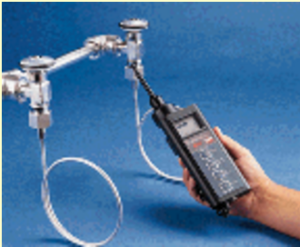How to use this tool
How to use this tool
At Stanford University, all toxic gas cylinders will be tested for leaks prior to removing cylinders from the delivery vehicle, if possible. Also, non-toxic gas cylinders such as flammables should be tested for leaks before acceptance. Leaking gas cylinders will not be accepted. The Principal Investigator (PI) who ordered the gas cylinder is responsible for ensuring that the cylinder is leak tested. Similarly, all compressed gas experimental apparatus should be leak tested periodically per the applicable experimental protocol. Only individuals trained in the use of leak detection methods should perform this leak test procedure.
Leak Detection Methods
The preferred and primary method for leak detection is a direct reading instrument with a sensor that uses thermal conductivity different from that of the ambient air for detection, such as the Matheson LeakHunter Plus Model 8066 or its equivalent. This type of detector is highly sensitive and can locate leaks too small to bubble quickly with a liquid solution leak detector.

Gases and vapors with thermal conductivity different from air can be detected with this method, and some are listed in the table below.
An alternate method, if the primary method cannot be used, is liquid solution leak detection such as the Matheson Detect-A-Leak™ or equivalent that meets or exceeds MIL-L-25567D Type I and II specifications.
| Gas | Detection limit | ACGIH TLV TWA (ppm) |
|---|---|---|
| Gas | Detection limit | ACGIH TLV TWA (ppm) |
| Acetone | 10 cc/min | 500 |
| Ammonia | 5 ppm | 25 |
| Arsine | 0.3 ppm | 0.05 |
| Benzene | 10 cc/min | 0.5 |
| Carbon Monoxide | 1 ppm | 25 |
| Chlorine | 7 ppm | 0.5 |
| Diborane | 0.15 ppm | 0.1 |
| 11-Dichloroethane | 10 cc/min | 100 |
| Ethanol | 10 c/min | 1000 |
| Ethylene | 1 cc/min | N/A |
| Ethylene Oxide | 350 ppm | 1 |
| Formaldehyde | 10 cc/min | C 0.3 |
| Freon 12 | 1 cc/min | 1000 |
| n-Hexane | 10 cc/min | 50 |
| Hydrogen | 10 ppm | N/A |
| Hydrogen Bromide | 1 ppm | C 3 |
| Hydrogen Chloride | 1 ppm | C 5 |
| Hydrogen Selenide | 0.5 ppm | 0.05 |
| Hydrogen Sulfide | 1 ppm | 10 |
| Isopropyl Alcohol | 10 cc/min | 400 |
| Methane | 1 cc/min | N/A |
| Methyl Bromide | 40 ppm | 1 |
| Methyl Chloride | 50 ppm | 50 |
| Methyl Ethyl Ketone (MEK) | 10 cc/min | 200 |
| Phosphine | 0.13 ppm | 0.3 |
| Propane | 1 cc/min | 2500 |
| Silane | 0.3 ppm | 5 |
| Sulfur Dioxide | 1 ppm | 2 |
| Toluene | 10 cc/min | 50 |
| Trichloroethylene | 10 cc/min | 50 |
| Vinyl Chloride | 10 ppm | 5 |
| Xylene | 10 cc/min | 100 |
